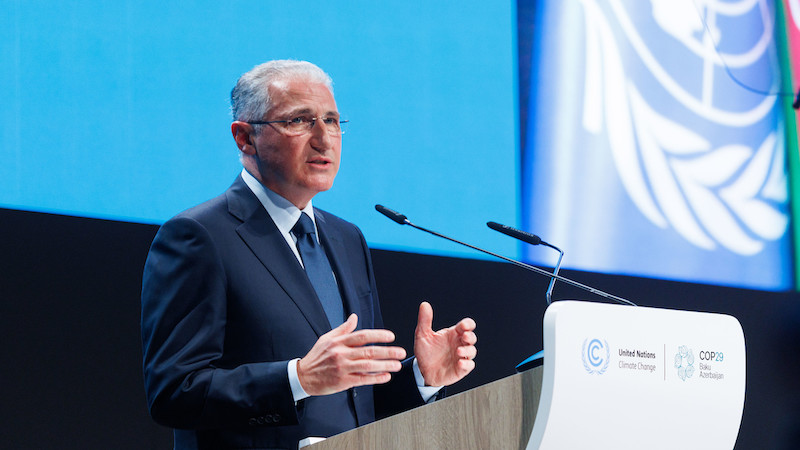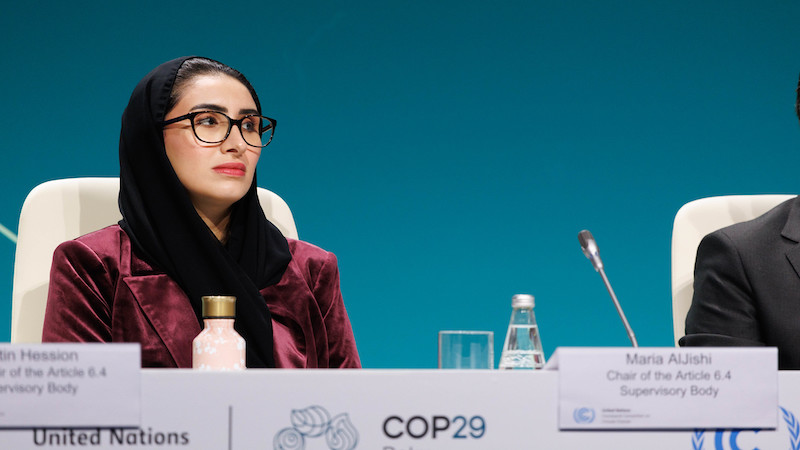Azerbaijan presidency claims Article 6 could help countries save $250 billion a year – but experts warn UN carbon trading is still some way off
Azerbaijan’s COP29 presidency claimed an early win at the start of the climate summit when countries waved through long-awaited – and controversial – rules laying the foundations for a new UN carbon market, without any debate.
But the approval of the documents setting out key guidelines – or “standards” – for the development of carbon credit projects and carbon removal activities provoked strong opposing reactions.
For some, including proponents of carbon credits and the COP29 presidency itself, the adoption late on the first day of the talks in Baku was a major “breakthrough” that ended a years-long deadlock and paved the way to raise hundreds of billions of dollars for climate action.
“This will be a game-changing tool to direct resources to the developing world,” COP29 President Mukhtar Babayev said.
UN climate chief Simon Stiell told reporters at a press conference on Tuesday that “this is not some bit of arcane UN bureaucracy”, but something that could help countries implement their climate plans “faster and cheaper”.
The Azerbaijan COP presidency put a number to that assertion, claiming that “co-operation across borders” under Article 6 of the Paris Agreement using carbon credits could reduce the cost of carrying out national climate plans by $250 billion every year.
That figure comes from a theoretical modelling exercise conducted in 2019 by the International Emissions Trading Association (IETA), a pro-carbon market group that counts among its members many of the world’s largest fossil fuel companies, including Saudi Aramco, ExxonMobil, Shell and BP.
Speaking to Climate Home, carbon market experts raised doubts over the $250-billion figure due to the number of assumptions made in the study that could be out-of-date by now.
“Relying on a single data point is never good science, let alone a figure that emerged before the rules had even been negotiated,” Injy Johnstone, a research associate in net-zero aligned offsetting at Oxford University, told Climate Home.
Governments struck a deal on the overarching rules for the development of the new Article 6 carbon market at COP26 in November 2021 – two years after the publication of the IETA study.
“Rushed” approval
Countries had failed to build on the Glasgow decision for the following two climate summits until the new standards were approved on Monday in Baku.
Many close watchers of carbon market talks strongly objected to the “unprecedented” decision to greenlight the rules in the opening plenary of COP29, bypassing the scrutiny of negotiators and observer groups. They voiced concerns not only about the risk of the resulting carbon credit projects producing dubious emission reductions and dragging down climate ambition, but also about the precedent this move sets.
“This decision should have not been rushed through without giving the space to adequately discuss the issues,” said Trishant Dev, programme officer for carbon markets at the Delhi-based Centre for Science and Environment (CSE). “Especially as, in previous years, several countries objected to the inadequate nature of these standards.”
Maria AlJishi, chair of the Article 6.4 Supervisory Body, speaking after a decision on carbon markets was adopted. Photo: UN Climate Change – Kiara Worth
While it caught many by surprise on Monday, the fast-tracked adoption of the rules stemmed from a strategic move made nearly a month ago by the Supervisory Body tasked with overseeing the development of the Article 6.4 crediting mechanism.
After several days of drawn-out discussions, this technical panel decided to directly adopt guidance on carbon-credit methodologies and carbon removals as “standards”, rather than forwarding it as a proposal to be fought over at COP.
Government negotiators were therefore presented with a complete document that they could either accept or reject as a whole without re-arranging any of its contents. They opted for the former, with a strong nudge from the Azerbaijan presidency that has made the “operationalisation” of Article 6 one of its top targets for the climate summit.
More work to be
Read More


